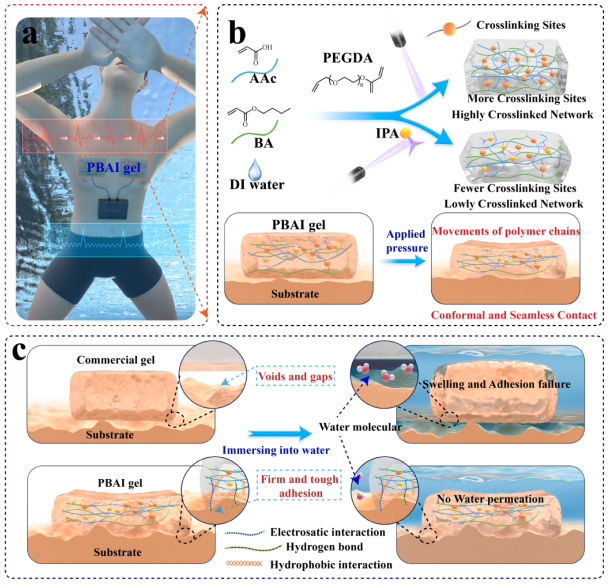Isopropanol-regulated adhesion-controllable conductive gels for robust bioelectric signal monitoring and flexible underwater robots
ABSTRACT: Flexible gel-based electrodes that can efficiently collect and conduct weak voltages or currents have been used to acquire human bioelectrical signals, thereby demonstrating significant potential for health management and telemedicine. Stable and reliable monitoring of electrocardiograms in an aqueous environment (sweating, swimming, or working underwater) remains a challenge, although it has been successfully achieved in air. In this study, conductive gels with high adhesion strengths were fabricated via isopropanol softening polymer chains. Isopropanol endows softer gels with low cross-linked networks, promoting gel deformation and polymer chain movement under pressure. Ultimately, strengthened mechanical interlocking and a seamless adhesion interface were formed. The gel showed substantial adhesion strengths on various substrates (22.89, 23.46, and 30.50 kPa on porcine skin, polymethyl methacrylate, and fabrics, respectively). Under hydrophobic interactions of butyl acrylate, gels can also firmly adhere to underwater substrates with adhesion energies of 33.88, 33.15, and 37.21 J/m2 on polymethyl methacrylate, polyvinyl chloride, and polycarbonate, respectively. Acrylic acid provides gels with intrinsic conductivity without the addition of other conductive materials. The considerable adhesion and interface impedance enable gels to collect continuous and reliable electrocardiogram signals, demonstrating significant promise for health monitoring and robotic arms.

Ming Xiaojuan, et al. Isopropanol-regulated adhesion-controllable conductive gels for robust bioelectric signal monitoring and flexible underwater robots. Chemical Engineering Journal, 2023, 460, 141746.